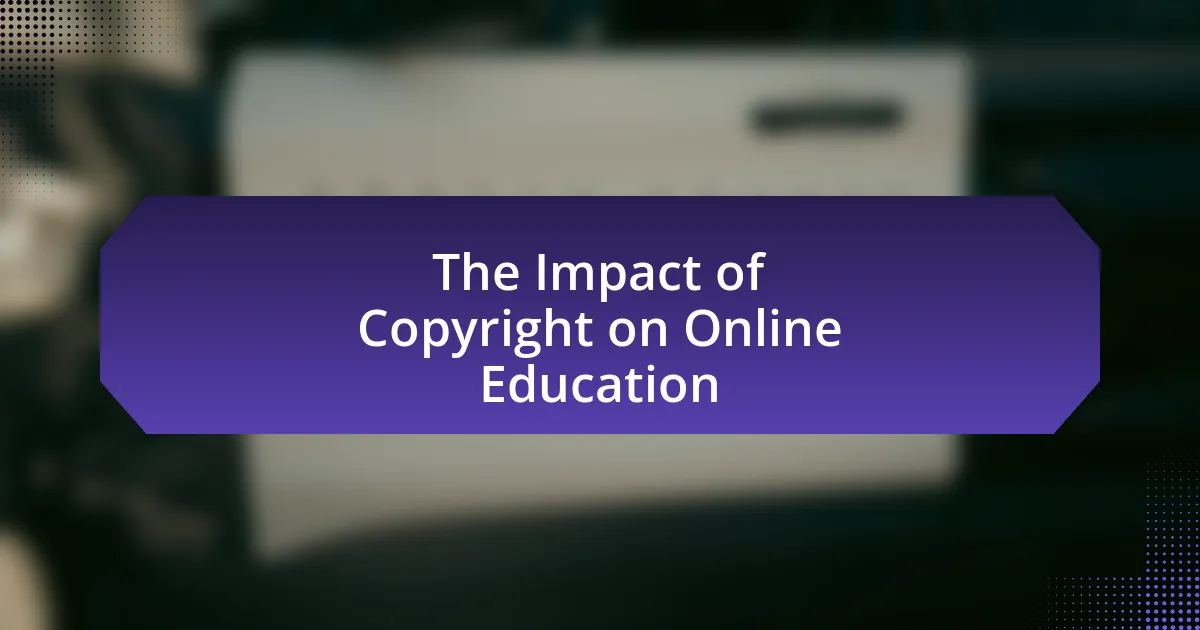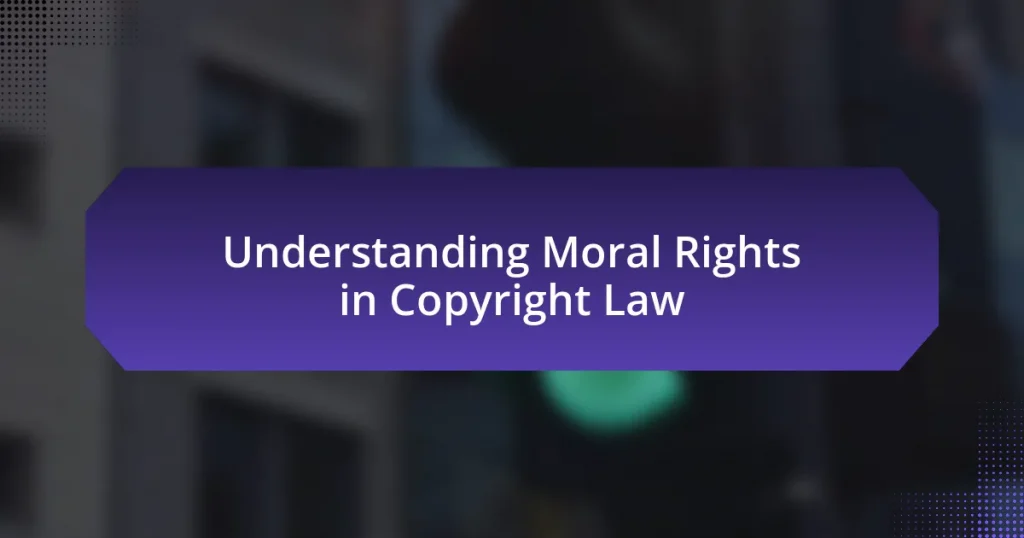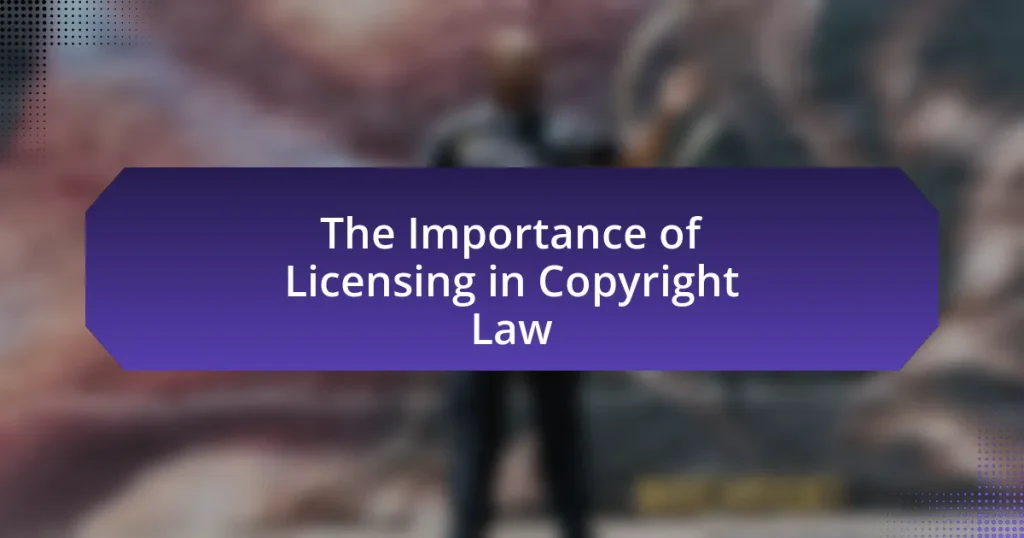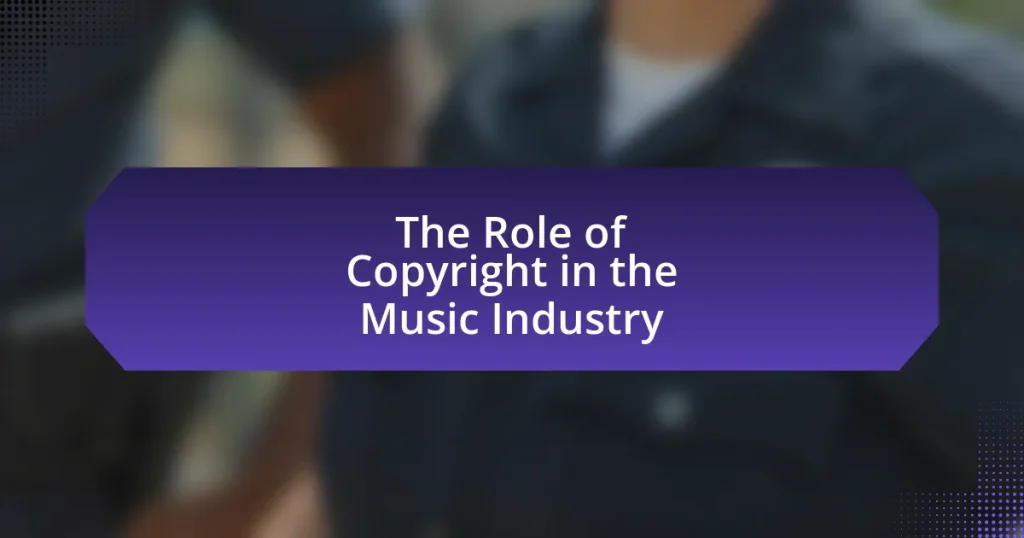The article examines the impact of copyright on online education, highlighting how copyright laws restrict the use of educational materials, which can limit access for both educators and students. It discusses the legal framework governing the use and distribution of educational content, including the principles of fair use and the necessity for permissions or licenses. The article also addresses the challenges educators face regarding copyright compliance, the consequences of copyright violations, and strategies for navigating these issues, including the use of Creative Commons licenses and open educational resources. Additionally, it outlines the differences in copyright laws across various countries and provides resources for educators to better understand and manage copyright in online education.
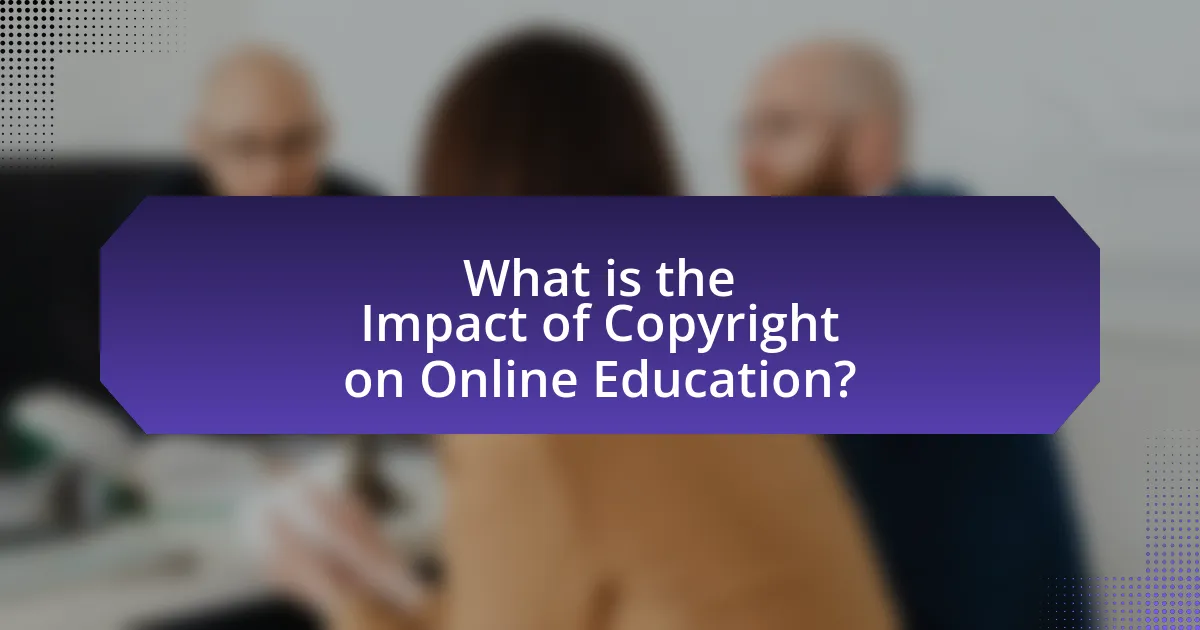
What is the Impact of Copyright on Online Education?
Copyright significantly impacts online education by restricting the use of educational materials, which can limit access to resources for both educators and students. The enforcement of copyright laws means that educators must navigate licensing agreements and permissions to use copyrighted materials, potentially hindering the development of course content. For instance, a study by the U.S. Copyright Office indicates that 70% of educators express concerns about copyright restrictions affecting their ability to provide comprehensive learning experiences. This limitation can lead to increased costs for educational institutions, as they may need to purchase licenses for materials that could otherwise be freely shared in an open educational resource framework.
How does copyright law influence online educational content?
Copyright law significantly influences online educational content by establishing the legal framework that governs the use and distribution of educational materials. This legal framework ensures that creators retain rights over their original works, which affects how educators can share, modify, and utilize these materials in online platforms. For instance, under the U.S. Copyright Act, educational institutions must navigate fair use provisions, which allow limited use of copyrighted materials without permission, but only under specific conditions such as purpose, nature, amount, and effect on the market. This legal structure encourages the creation of open educational resources (OER), which are designed to be freely accessible and modifiable, thus promoting wider dissemination of knowledge while respecting intellectual property rights.
What are the key principles of copyright law relevant to online education?
The key principles of copyright law relevant to online education include the protection of original works, the concept of fair use, and the requirement for permission to use copyrighted materials. Copyright law protects the rights of creators by granting them exclusive rights to reproduce, distribute, and display their works, which is crucial in an online educational context where digital content is widely shared. Fair use allows limited use of copyrighted material without permission for purposes such as criticism, comment, news reporting, teaching, scholarship, or research, but it is subject to specific criteria including the purpose of use, the nature of the copyrighted work, the amount used, and the effect on the market value of the original work. Additionally, educators and institutions must obtain permission or licenses for materials that do not fall under fair use, ensuring compliance with copyright regulations while promoting educational access.
How do copyright laws differ across various countries in the context of online education?
Copyright laws vary significantly across countries, impacting online education by determining how educational materials can be used, shared, and distributed. For instance, in the United States, the Fair Use doctrine allows limited use of copyrighted materials without permission for educational purposes, while in the European Union, the Copyright Directive emphasizes the need for licensing agreements for educational content, which can restrict access. In countries like Canada, the Copyright Act includes specific provisions for educational institutions, allowing them to use certain materials without infringing copyright, but this is not universally applicable. These differences can affect the availability of resources, the cost of educational materials, and the overall accessibility of online education across different regions.
What challenges do educators face regarding copyright in online education?
Educators face significant challenges regarding copyright in online education, primarily due to the complexity of copyright laws and the rapid evolution of digital content. The ambiguity surrounding fair use, especially in educational contexts, often leads to confusion about what materials can be legally used in online courses. Additionally, the proliferation of digital resources complicates the ability to track and obtain permissions for copyrighted materials, making it difficult for educators to ensure compliance. According to a study by the American Association of University Professors, 70% of educators reported uncertainty about copyright issues, highlighting the pervasive nature of this challenge in the online education landscape.
How can copyright infringement occur in online educational settings?
Copyright infringement can occur in online educational settings when educators or students use copyrighted materials without proper authorization or licensing. This can happen through the unauthorized distribution of textbooks, articles, videos, or images in online courses, where materials are shared without permission from the copyright holders. Additionally, posting lecture notes or course materials that include copyrighted content on platforms accessible to others can also constitute infringement. According to the U.S. Copyright Office, using copyrighted works without permission, especially in a public or commercial context, violates copyright law.
What are the consequences of copyright violations for educators and institutions?
Copyright violations for educators and institutions can lead to legal repercussions, financial penalties, and damage to reputations. Educators may face lawsuits from copyright holders, which can result in costly settlements or fines. Institutions may also incur liability, leading to potential loss of funding or grants. Additionally, violations can result in disciplinary actions against educators, including termination or loss of teaching credentials. According to the U.S. Copyright Office, unauthorized use of copyrighted materials can lead to statutory damages ranging from $750 to $30,000 per work, emphasizing the financial risks involved.
What role does fair use play in online education?
Fair use plays a critical role in online education by allowing educators to use copyrighted materials without permission under certain conditions. This legal doctrine enables teachers and students to access and share educational resources, such as videos, articles, and images, which enhances learning and fosters academic collaboration. For instance, the U.S. Copyright Act of 1976 outlines four factors to determine fair use: the purpose of use, the nature of the copyrighted work, the amount used, and the effect on the market value of the original work. These guidelines support educational institutions in integrating diverse materials into their curricula while respecting copyright laws.
What constitutes fair use in the context of online educational materials?
Fair use in the context of online educational materials allows limited use of copyrighted content without permission for educational purposes. This is determined by four factors: the purpose and character of the use, the nature of the copyrighted work, the amount and substantiality of the portion used, and the effect of the use on the market for the original work. For instance, using a short excerpt from a textbook for a lecture or discussion can qualify as fair use, especially if it is transformative and does not negatively impact the market value of the original work. Legal precedents, such as the case of Campbell v. Acuff-Rose Music, Inc., support this framework by emphasizing the importance of these factors in assessing fair use.
How can educators determine if their use of copyrighted materials falls under fair use?
Educators can determine if their use of copyrighted materials falls under fair use by applying the four-factor test established by U.S. copyright law. This test evaluates the purpose and character of the use, the nature of the copyrighted work, the amount and substantiality of the portion used, and the effect of the use on the market for the original work. For instance, using copyrighted materials for educational purposes, such as criticism or commentary, often favors fair use, especially if the use is transformative. Additionally, using small excerpts rather than entire works typically supports a fair use claim. The U.S. Copyright Office provides guidelines that further clarify these factors, emphasizing that no single factor is determinative, and the context of each situation must be considered.
How can educators navigate copyright issues in online education?
Educators can navigate copyright issues in online education by understanding and applying the principles of fair use, obtaining necessary permissions, and utilizing open educational resources (OER). Fair use allows limited use of copyrighted material without permission for purposes such as teaching, scholarship, or research, provided it meets specific criteria, including the purpose of use, the nature of the work, the amount used, and the effect on the market value. Additionally, educators should seek licenses or permissions for materials that do not fall under fair use. Utilizing OER, which are freely accessible and openly licensed educational materials, can significantly reduce copyright concerns while providing quality resources for teaching. According to the U.S. Copyright Office, understanding these aspects is crucial for compliance and effective teaching in digital environments.
What strategies can educators employ to ensure compliance with copyright laws?
Educators can ensure compliance with copyright laws by implementing strategies such as utilizing Creative Commons licensed materials, providing proper attribution, and adhering to the Fair Use doctrine. Creative Commons licenses allow educators to legally use and share resources while respecting the rights of creators. Proper attribution involves acknowledging the original authors of the materials used, which is essential for maintaining ethical standards and legal compliance. Additionally, understanding and applying the Fair Use doctrine, which permits limited use of copyrighted material without permission under specific circumstances, enables educators to incorporate necessary resources in their teaching while minimizing legal risks. These strategies collectively help educators navigate copyright laws effectively in online education settings.
How can educators effectively use Creative Commons licenses in their online courses?
Educators can effectively use Creative Commons licenses in their online courses by selecting appropriate licenses that align with their teaching goals and sharing practices. By choosing licenses such as Attribution (CC BY) or Attribution-ShareAlike (CC BY-SA), educators can allow students to use, modify, and distribute course materials while ensuring proper credit is given. This approach not only fosters collaboration and creativity among students but also promotes the legal sharing of educational resources. According to a study by the University of Massachusetts, the use of Creative Commons licenses in educational settings increases access to high-quality resources and encourages the development of open educational practices.
What resources are available for understanding copyright in online education?
Resources available for understanding copyright in online education include the U.S. Copyright Office website, which provides comprehensive guidelines on copyright law, and the Association of American Colleges and Universities (AAC&U), which offers resources specifically tailored for educators. Additionally, the Creative Commons organization provides licenses and educational materials that clarify how copyright can be applied in educational contexts. The “Code of Best Practices in Fair Use for Open Educational Resources” by the Association of College and Research Libraries serves as a practical guide for educators navigating copyright issues. These resources collectively offer essential information and practical guidance for understanding copyright in the realm of online education.
Where can educators find reliable information on copyright laws and guidelines?
Educators can find reliable information on copyright laws and guidelines through the U.S. Copyright Office website, which provides comprehensive resources and legal information regarding copyright. This official source includes details on copyright registration, fair use, and educational exemptions, ensuring that educators have access to accurate and up-to-date legal standards. Additionally, organizations such as the Association of Educational Publishers and the American Library Association offer guidelines and resources specifically tailored for educators navigating copyright issues in online education.
What organizations provide support and resources for copyright issues in education?
Organizations that provide support and resources for copyright issues in education include the Association of American Publishers (AAP), the Copyright Clearance Center (CCC), and the American Library Association (ALA). The AAP offers guidance on copyright laws affecting educational materials, while the CCC provides licensing solutions for educational institutions to legally use copyrighted content. The ALA advocates for the rights of libraries and educational institutions regarding copyright, offering resources and training on fair use and copyright compliance. These organizations play a crucial role in helping educators navigate copyright challenges in online education.
What best practices should educators follow to respect copyright in online education?
Educators should follow several best practices to respect copyright in online education, including obtaining permission for copyrighted materials, using Creative Commons licensed resources, and adhering to the Fair Use doctrine. Obtaining permission ensures that educators have the legal right to use specific materials, while Creative Commons resources provide a wealth of content that is free to use under certain conditions. The Fair Use doctrine allows limited use of copyrighted materials for educational purposes, but educators must evaluate factors such as the purpose, nature, amount, and effect of the use on the market value of the original work. These practices help educators navigate copyright laws effectively and foster a respectful learning environment.
